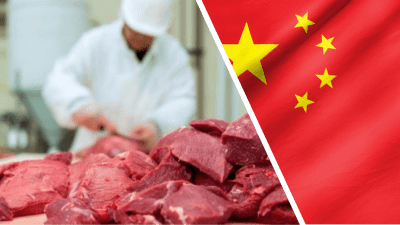WILD rumours circulating around the red meat industry since Sunday that China may have suspended, or be poised to suspend all meat imports from Australia appear to be exactly that – rumours.
Industry stakeholders have been on high alert since the suggestions first started to emerge on Sunday evening, but nothing to this point suggests they have any foundation.
 Earlier, the rumours kept evolving, at one point suggesting New Zealand was also under suspension, and the action would extend across beef, sheepmeat and grain.
Earlier, the rumours kept evolving, at one point suggesting New Zealand was also under suspension, and the action would extend across beef, sheepmeat and grain.
The rumours were also picked up in China, creating brief beef trade disruptions yesterday morning, however business today is now effectively back to normal, Beef Central was told.
An Australian export trader with impeccable connections with the China market this morning said that by Monday morning, some lower level Chinese customers started withholding deposits on deals completed earlier.
But that was all gone by about 4pm yesterday (Monday), with trade as of today now effectively back to normal. In fact he had received deposits this morning, on new deals negotiated at prices higher than Friday’s rates.
“The original false report (see summary below) did not make sense to us, because the terms it described were for beef ‘in the warehouse and on the wharf’,” the trader said.
“If that was the case, the Chinese importers would have paid for their meat by then, so the importers themselves, rather than Australian exporters, would have borne the brunt of any suspension. If that product was in fact banned, it would have had huge ramifications for Chinese importers themselves.”
“It (the original false statement) did not make sense to us, from the start. But China is still the wild west – who knows where the noise originally came from,” the trader said.
Attempt at price manipulation?
One suggestion has been that the rumour was spread as part of an attempt to manipulate meat prices, in the lead-up from September to the intensive meat buying period designed to cater for Chinese New Year (next year being celebrated 22 January) .
 The first counter-argument to that is that it was too early, because any disturbance or ‘fear’ would have had to last for months, rather than days, to have any real effect on pricing during the busiest period.
The first counter-argument to that is that it was too early, because any disturbance or ‘fear’ would have had to last for months, rather than days, to have any real effect on pricing during the busiest period.
“Because of the lack of maturity in the China market, if it was an attempt to manipulate prices heading into Chinese new year buying, it may actually have the opposite effect,” a regular Chinese meat trade source said.
“Fears around food security remains a primary motivator of Chinese buying. Export volume from all beef exporting countries to China over the past three months is well down. They have not imported as much beef this year as they have over the previous four years,” he said.
“If that was the rationale behind spreading the rumour, it has had the opposite effect. While the currency has moved a little as well since last week, we have booked meat for China this morning (Tuesday) at higher levels than what we offered on Friday.”
“But to be honest, everyone is always on tenterhooks in dealing with China. Recent geo-political issues over Taiwan, and the FMD challenges, have only made things worse,” the trader said.
“But given the sensitivities, it is important for Australia to get its messaging right.”
Credible source?
Beef Central chose not to write about the rumours of market suspension yesterday, because of the absence of any evidence that the claims were true, and questions about the credibility of the original source.
The basis for the rumours was an item published on a crudely-designed Hong Kong based web-page called weixin.qq.com, with no connection to any credible government, regulatory, media or market analysis group source. Click here to view the original item.
It describes itself as ‘World Meat Imports Report’, but nobody Beef Central spoke to had any prior knowledge of the service, nor the website.
The key message in the web page published on Sunday said:
“China has just announced a temporary suspension of customs clearance and cargo releases for all Australian and New Zealand goods, including meat, dairy, agricultural products and more. From today, all arriving cargo is awaiting further notice at the terminal. The Australian products in the first-level warehouse are prohibited from being shipped out of the warehouse, and the products arriving in Hong Kong are prohibited from customs clearance. At present, the customs official has not issued an official announcement, but the relevant business links have been notified.”
In discussion below this, it did point out that Chinese customs officials had not issued an official announcement. But to many, the damage had already been done by what was published above it. It is unclear whether auto-translation issues affected the message, but Australian processors with Chinese-speaking staff confirmed the general thrust and tenor of the message.
Neither Chinese meat importers nor Australian exporters, nor the Australian government or regulatory bodies, have received any such notification mentioned in the statement, and the report is now being interpreted in Australia as not only completely inaccurate, but probably mischievous.
The question must be asked: Did anybody bother to check the veracity of the original source?
Government and industry stakeholders have since Sunday been monitoring official Chinese regulatory websites for signs of any developments.
Australian media headlines like “China ‘suspends’ Aussie beef imports” published yesterday afternoon did not help.
Given the crude visual appearance of the weixin.qq.com web-page, to describe it as a ‘Chinese media’ source was a real stretch, to say the least.
If there is anything to be learned from this unfortunate episode, it is not to simply take ‘words written in a foreign language on the web’ as gospel, without applying some due diligence first.
AMIC buried under avalanche of inquiries
Australian Meat Industry Council chief executive Patrick Hutchinson said AMIC had received countless emails, texts and phone messages about the issue from concerned members, plus lotfeeders, beef producers and others along the supply chain over the past 24 hours.

Patrick Hutchinson
He said nobody in Australia he had spoken to had ever heard of the source, weixin.qq.com, before.
“But if people had read the whole passage, it clearly says towards the bottom that nothing has been finalised by the Chinese Government.”
“There is nothing we can say about an issue that does not exist,” he said. “AMIC has been able to methodically review the claims in the original statement, and completely dismiss it.”
“Rumours can (and sometimes do) fly in China, but unless the government makes an official proclamation, that’s all they are – rumours,” Mr Hutchinson said.
“But media in Australia yesterday grabbed the original statement, and presented it in such a way that sounded like a ban had occurred. People in the industry are incensed, because it’s simply not true.”
“Again, we have seen hysteria in reporting in Australia, based on unfounded heresay, which is potentially destabilising and damaging the industry.”
“Our members (export processors) have to once again start answering questions from customers overseas based on false statements, and which had already been answered, because of sensationalised publishing and re-printing. Simply creating a sensationalist story out of nothing.”
“Such reporting is ostensibly claiming to ‘look after farmers’ interests’, but inevitably it is doing the opposite.”
“The lesson that needs to be learned from here was that we (the Australian beef industry) are living and operating in a volatile market arena, and that supply chains continue to face fragility, from many directions and issues. Misreporting on issues like FMD, and this China access matter, does not help,” he said.
Year-to-date, Australia has exported around 85,000t of beef to China – around 80pc of which was in frozen form. That’s much the same as the same period last year, when the country also had COVID lockdowns in place for long periods, but a far cry from volumes shipped in January-July 2020 which reached 133,000t.



HAVE YOUR SAY